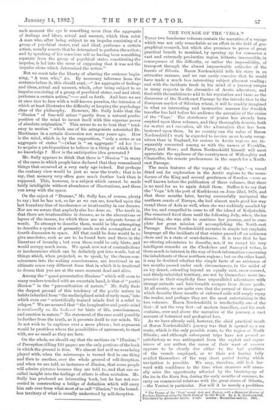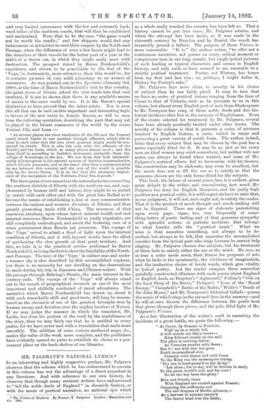THE VOYAGE OF THE 'VEGA?*
THESE two handsome volumes contain the narrative of a voyage which was not only remarkable as an effort in the field of geo- graphical research, but which also promises to prove of great practical benefit to mankind, by opening up for commerce a vast and extremely productive region hitherto inaccessible, in consequence of the difficulty, or rather the impossibility, of transport through the almost impenetrable solitudes of the forests of Siberia. Baron Nordenskiold tells his story in an attractive manner, and we can easily conceive that he would have made a much less interesting subject pleasant reading; and with the incidents fresh in his mind of a journey unique in many respects in the chronicles of Arctic adventure, and fired with the ambition to add to his reputation and fame as the discoverer of the North-east Passage by the introduction to the European market of Siberian wheat, it will be readily imagined in what an interesting and instructive manner the Swedish traveller has laid before his audience the narrative of the cruise of the 'Vega.' The storehouse of praise has already been emptied upon these volumes, and they thoroughly deserve, both for matter and execution, all the a Imiration that has been bestowed upon them. In no country can the value of Baron Nordenskiold's work he expected to receive more hearty recog- nition than in England, for cruises in Arctic regions are in- separably connected among us with the names of Franklin, Parry, and Ross ; and Baron NordenskiOld himself will most appreciate the applause of the countrymen of Willoughby and Chancellor, his remote predecessors in the search for a North- east Passage.
The main features of the voyage of the ' Vega '—a vessel fitted out for exploration in the Arctic regions by the muni- ficence of the King and several gentlemen of Sweden —were so well known before the publication of these volumes, that there is no need for us to again detail them. Suffice it to say that the ' Vega' left the port of Karlskrona on June 22nd, 1878, and that three months later, having successfully navigated the northern coasts of Europe, she had almost made good her way round those of Asia as well, when she was suddenly assailed by the ice, and compelled to come to off the island of Koljutschin. She remained fixed there until the following July, when, the ice dissolving, she was able to continue her journey, and to com- plete her great mission of accomplishing the North-east Passage. Baron Nordenskii5ld narrates in simple but emphatic language all the incidents of that winter passed off an unknown shore and in a state of semi-darkness. It is true that he has
no stirring adventures to describe, nor, if we except his very intelligent remarks on the Chukches and Samoyed tribes, is
there much to interest in the way of fresh information concerning the inhabitants of these northern regions ; but on the other hand, it may be doubted whether the simple facts of an existence of ten months passed under such circumstances, in the midst of an icy desert, extending beyond an equally vast, snow-covered, and thinly-inhabited territory, are not by themselves more im. pressive iu their simplicity than unparalleled adventures with strange animals and hair-breadth escapes from divers perils, At all events, we are quite sure that the perusal of those pages which describe these months of enforced exile will amply repay the reader, and perhaps they are the most entertaining in the two volumes. Baron Nordenskiold is intellectually one of the first—if not the very first—of modern travellers, and his work contains, over and above the narrative of the journey, a vast amount of botanical and geological lore.
As we have already said, however, the chief practical result of Baron Nordenskifild's journey was that it opened up a sea route, which is the only possible route, to the region of North Siberia ; and although subsequent trips have not proved as satisfactory as was anticipated from the exploit and exper- iences of our author, the cause of their want of success appears to be clearly due either to the bad qualities of the vessels employed, or to their not having fully availed themselves of the very short period during which navigation is possible. We may, therefore, still look for- ward with confidence to the time when steamers will annu- ally seize the opportunity afforded by the breaking-up of the ice in the Kara Sea, during the early months of summer, to carry on commercial relations with the great rivers of Siberia, —the Yenisei in particular. Nor will it be merely a profitless • The Voyage of the ' Vega' round Asia and Europe, with a Historical Review of Previous Journeys along the North Coast of 'he Old World. By A. IL Nordenskiold. Translated by Alexander Leslie. 2 vole. 'iondon : Macmillan and Co. 1881.
and very limited intercourse with ace few and extremely back- ward tribes of the northern coasts, :that will thus be established and maintained. Were that to be the case, "the game would not be worth the candle ;" and few shippers would find any inducement or attraction to send their cargoes by the North-east Passage, when the difference of even a few hours might lead to the detention of their vessels for the better part of a year in the midst of a frozen sea, in which they might easily meet with destruction. The prospect raised by Baron Nordenskiold's experience, and shown to be practicable by the feat of the ' Vega,' is, fortunately, more attractive than this would be, for it contains promise of very solid advantage as an avenue of commerce. As was pointed out in the Spectator (January 3rd, 1880), at the time of Baron Nordenskiold.'s visit to this country, the great rivers of Siberia afford the true roads into that vast territory, if it can be shown that there is any available means of access to the outer world by sea. It is the Baron's special distinction to have proved that the latter exists. Nor is even this all that can be said on this important and interesting topic in favour of the new route to Asiatic Russia, as will be seen from the following quotation, describing the part that may yet be played in the future commerce of the world by the rivers Yenisei, Obi, and Lena :—
" At several places the river territories of the Ob and the Yenesej nearly reach hands to one another through affluents, which rise so close to each other that the two river systems might easily be con- nected by canals. This is also the case with the affluents of the Yenisej and the Lena, which at many places almost meet ; and the Lena itself is, according to Latkin's statement, navigable from the village of Kotschnga to the sea. We see from this how extraordi- narily advantageous is the natural system of interior communication which Siberia possesses, and at the same time that a communication by sea between this country and the rest of the world is possible only by the Arctic Ocean. It is on this that the enormous import- ance of the navigation of the Northern Polar Sea depends."
The three great rivers named are the natural arteries connecting the southern districts of Siberia with the northern sea, and, sup- plemented by human skill and labour, they might be so united by canals with each other and with the great lake Baikal as to become the means of establishing a line of easy communication between the eastern and western divisions of Siberia, and thus greatly promoting trade with China. The resources of that enormous territory, upon whose latent mineral wealth and vast internal resources Baron Nordenskiiild so justly expatiates, are still completely undeveloped, and await the fostering care of a wiser government than Russia yet possesses. The voyage of the ' Vega' served to admit a flood of light upon the internal 'condition of Siberia, and it will, beyond doubt, have the effect of quickening the slow growth of that great territory. And this, we take it, is the practical service performed by Baron Nordenskiold, in being the first to show the feasibility of the North- east Passage. The tour of the ' Vega ' in calmer seas and under a warmer sky is also described by this accomplished explorer, but there is no necessity for our dwelling on the observations he made during his trip in Japanese and Chinese waters. With the passage through Behring's Straits, the main interest in the journey ends. The voyage of the ' Vega' will always stand out in the annals of geographical research as one of the most important and skilfully conducted of naval adventures. The narrative which Baron Nordenskiold has drawn up about it with such remarkable skill and good-taste, will long be remem- bered as the chronicle of one of the greatest triumphs won by human energy and devotion over the mighty barriers of Nature. If we may judge the manner in which the translator, Mr. Leslie, has done his portion of the work by the readableness of the story, then we may fairly say that he is entitled to every praise, for we have never met with a translation that reads more smoothly. The addition of some curious medileval maps, &c., makes the value of the work more complete, and the publishers have evidently spared no pains to establish its claims to a per- manent place on the book-shelves of our libraries.







































 Previous page
Previous page